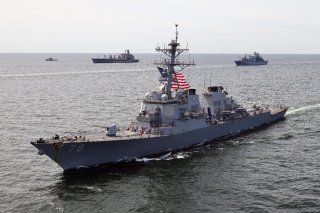Caleb Larson

As they are both poised to join the North Atlantic Treaty Organization (NATO), Sweden and Finland are set to significantly alter the strategic calculus in the Arctic and the Baltic Sea. Since the two countries are already tightly integrated with NATO, they would not struggle to fully integrate into the security alliance quickly.
Speaking to reporters, Chief of Naval Operations, Adm. Mike Gilday, explained to reporters what that integration would look like. “They’re high-end operating militaries that have worked with us for a long time in very close partnership. So their transition into NATO is – I would predict – is going to be virtually seamless in the military dynamic. I think about the Arctic Basin and I think about the real estate that their coastline [has] along the Arctic Basin,” Admiral Gilday explained.
“I think that in the future, as we see the polar ice cap receding, we see trade routes between Asia and Europe change, and competition for resources get more competitive in that area, I think that’s an example where Sweden and Finland – where we leverage their geostrategic position in a powerful way for the good of many,” he stated.
French Navy Chief of Staff Adm. Pierre Vandier largely concurred with his American counterpart, explaining that Stockholm and Helsinki joining would be “a huge strategy change for northern Europe and so the strategy in the Baltics will change because there is a continuity of NATO, which now has a new border with Russia.”
“And considering the Great North – the climate change will open routes and probably we’ll see more and more activity in the [Great] North,” the Admiral said, “perhaps we will see one day [a] fleet crossing from the Pacific to the Atlantic. And so it is for Europe a major strategy change,” he continued.
Russia’s ongoing invasion of Ukraine has exposed serious security shortcomings in Europe, gaps that some countries are now scrambling to fill. The conflict has also underscored the importance of intelligence-sharing amongst allies and the need for tighter information sharing.
Speaking to reporters, Admiral Gilday concurred. “I think that the cooperation we’ve seen across NATO during this Russia-Ukraine crisis, and the sharing of information, intelligence from the United States, has also given us momentum to break down barriers and trade information and technology with our close partners like the French,” he said.
Not only will the United States Navy’s fourth and fifth-generation stealth fighters need to network amongst themselves, but they will also have to operate alongside multiple allied fighters and aircraft carriers from NATO members.
No comments:
Post a Comment